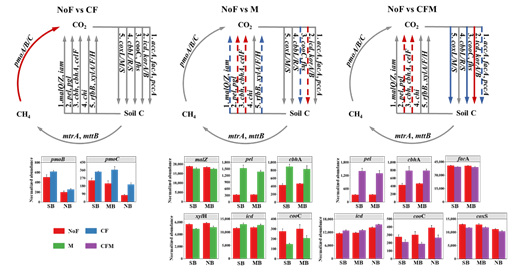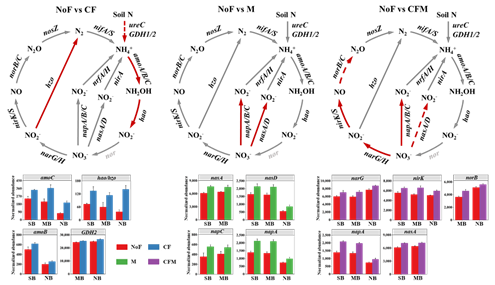The balance and distribution of soil carbon (C) and nitrogen (N) are crucial for the maintenance of soil quality and crop growth, which are directly related to the stability and productivity of agroecosystems. However, less attention has been given to understand the effects of long-term different fertilization regimes on microbial metabolic potentials the in the black soil region.
Now, researchers from the Northeast Institute of Geography and Agroecology (IGA) of the Chinese Academy Sciences, have revealed the key functional genes involved in soil C and N cycling in response to chemical and organic fertilizers addition, which help to maintaining ecological balance for sustainable utilization of black soils.
The study was published on Mar. 28 in Geoderma.
The researchers collected the fresh soil samples from well managed and continuous fertilized field experiments over 30 years in the northern (NB), middle (MB) and southern (SB) areas of the black soil region in Northeast China. A combination of metagenomics and statistical tools was applied to quantify the abundances and profiles of functional genes involved in soil microbial C and N cycling.
They found that long-term application of chemical fertilizers significantly promoted the metabolic potential of methane oxidation, soil N degradation, nitrification and anammox, and thus likely induced C and N loss via gaseous emissions.
Differently, manure fertilization considerably shifted C fixation and degradation processes, and accelerated the assimilatory and dissimilatory nitrate reduction pathways, which could enhance the retention of soil available C and N for crop uptake in this region. Nevertheless, the combination of chemical and organic fertilizers significantly increased soil denitrification-related genes, increased the probability of N2O emissions.
Moreover, tightly coupled C and N cycles regulate nutrient concentrations and metabolites to ensure that N uptake matched the supplemented C, which help to maintain the homoeostasis of ecological functions and adaptation to environmental disturbances.
“Our study demonstrated that moderate application of organic fertilizers could promote the potential transformation and availability of soil C and N by stimulating microbial growth and metabolism”, said WANG Guanghua, professor at the IGA.
The study was jointly supported by the Strategic Priority Research Program of Chinese Academy of Sciences, National Natural Science Foundation of China and Professional Association of the Alliance of International Science Organizations.
The finding of this study was recently published online in Geoderma.
http://www.elsevier.com/wps/find/journaldescription.cws_home/332/description#description
Keywords: Soil metagenomics; Functional genes; Carbon and nitrogen cycling; Long-term fertilization; Mollisols
The full information of the article:
HU Xiaojing, GU Haidong, LIU Junjie, WEI Dan, ZHU Ping, CUI Xi’an, ZHOU Baoku, CHEN Xueli, JIN Jian, LIU Xiaobing, WANG Guanghua*. Metagenomics reveals divergent functional profiles of soil carbon and nitrogen cycling under long-term addition of chemical and organic fertilizers in the black soil region. Geoderma. 2022, 418, 115846.
https://doi.org/10.1016/j.geoderma.2022.115846
Prof. WANG Guanghua, Ph.D Principal Investigator
Northeast Institute of Geography and Agroecology,Chinese Academy of Sciences
Harbin, Heilongjiang 150081, China
Tel: 0451-86602745
E-mail: wanggh@iga.ac.cn

Figure 1. Microbial functional genes involved in soil C cycling affected by long-term different fertilization regimes in the black soil region of Northeast China. (Image by HU Xiaojing)

Figure 2. The influences of long-term different fertilization regimes on microbial functional genes involved in soil N cycling in the black soil region of Northeast China. (Image by HU Xiaojing)

